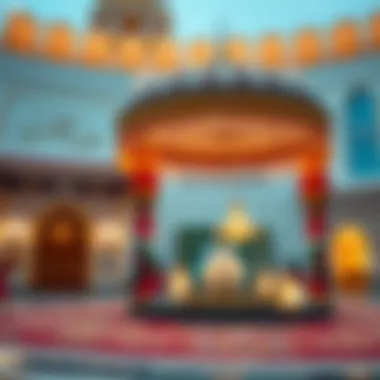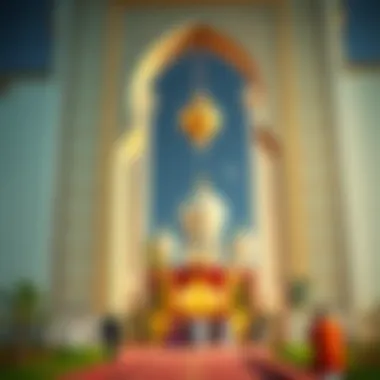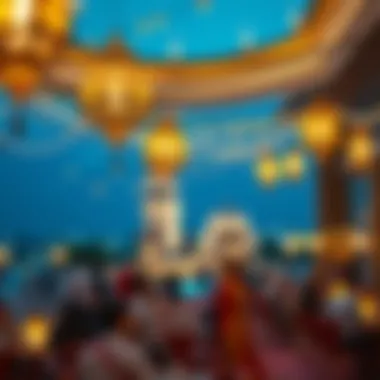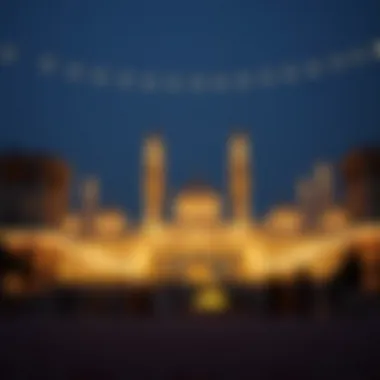Eid ul-Fitr Holiday in the UAE 2024: Traditions and Impact


Intro
Eid ul-Fitr, marking the conclusion of Ramadan, stands as one of the most significant holidays in the UAE, celebrated with fervor and excitement. As the holy month comes to an end, families and communities come together to partake in age-old customs, rituals, and of course, the joy of breaking the fast. This article delves into the multifaceted layers of Eid ul-Fitr in 2024, uncovering its historical significance, examining local traditions, and exploring its economic implications for both residents and investors alike.
Understanding the nuances of this holiday offers crucial insights into the lifestyle changes around this time and how they ripple through the real estate market of Dubai. Intrinsic to the local culture, the manner in which Eid is observed reflects the broader values and social structures of Emirati society.
With the growing interest from expatriates and investors in the UAE, comprehending the celebrations can serve as a beacon, helping to navigate the evolving landscape of the cultural and economic environment. Through this guide, we shall traverse the vibrant atmosphere of Eid ul-Fitr, capturing its essence and importance to both the community and the market at large.
Understanding Eid ul-Fitr: Historical and Cultural Context
Eid ul-Fitr represents one of the most significant milestones in the Islamic calendar, marking the end of Ramadan, a month of fasting, reflection, and community. Understanding its historical and cultural context is essential; this understanding not only echoes the deep-seated traditions but also illustrates the contemporary significance of the holiday, especially within the UAE. For investors, expatriates, and anyone intrigued by the societal fabric of the emirates, grasping the essence of Eid ul-Fitr can provide valuable insights into the local customs and consumer behaviors prevalent during this time.
Historical Origins of Eid ul-Fitr
Eid ul-Fitr traces its roots back to the time of the Prophet Muhammad in the 7th century. Traditionally, it is believed that Eid was established as a means for Muslims to celebrate the conclusion of fasting during Ramadan. The first Eid ul-Fitr was observed in Medina, where the Prophet Muhammad and his followers had settled. During this period, the people were instructed to give Zakat al-Fitr, a form of charity, ensuring those less fortunate could also partake in the festivities.
Over the years, various practices associated with the holiday emerged, ranging from special prayers at mosques to communal feasting and merriment. The prominence of Eid ul-Fitr is also reinforced by the teachings of Islam, emphasizing community, charity, and gratitude. In essence, this celebration captures the spirit of togetherness after a month of spiritual dedication and sacrifice.
Cultural Significance in the UAE
In the UAE, Eid ul-Fitr exemplifies cultural unity, as residents from various backgrounds come together to celebrate. The kingdom’s unique blend of tradition and modernity shapes how Eid is observed. On one hand, you have majlis gatherings, where families and friends exchange well-wishes and enjoy sumptuous meals; on the other, the emigration of diverse cultures has infused new culinary flavors and festive practices into the holiday.
Moreover, Eid in the UAE is also a reflection of its collective identity. Public rituals such as communal prayers at grand mosques, including the Sheikh Zayed Grand Mosque, showcase the substantial turnout of worshipers, underlining a shared reverence for the occasion. The holiday is embraced not just by Muslims but also resonates with expatriates who find joy in the communal spirit, creating an inclusive atmosphere.
Eid ul-Fitr is more than just a holiday; it is a vivid reminisce of traditions being passed through generations while adapting to modern influences. From charitable acts to cultural festivities, the day serves as a reminder of values cherished across the diverse population of the UAE. Understanding these nuances can be essential for those looking to invest or integrate into this vibrant society.
"The importance of Eid ul-Fitr transcends mere celebration; it embodies the essence of community and charity, crucial in the UAE’s dynamic culture."
As we delve deeper into the observances and traditions in upcoming sections, it is crucial to appreciate the historical roots and cultural context that shape the celebrations of Eid ul-Fitr in the UAE.
Eid ul-Fitr Dates and Observations in
The observance of Eid ul-Fitr is not merely a festive occasion but rather a significant cultural event that resonates deeply within the UAE community. Understanding the dates associated with Eid ul-Fitr 2024 is crucial for both residents and investors, as it encapsulates various activities, public dynamics, and economic factors that emerge during this time. This section aims to dissect the expected dates of the holiday and the accompanying public holiday schedule, providing an insight into how these observances shape social interactions and commerce within the UAE.
Expected Dates Based on Lunar Calendar
The timing of Eid ul-Fitr is contingent upon the lunar calendar, specifically determined by the sighting of the new moon. For 2024, the anticipated start of Eid ul-Fitr is projected to occur on Sunday, April 21, 2024, contingent upon the moon sighting the night before. This calculated date, while preliminary, serves as a foundation around which families and communities plan their celebrations. Many people will prepare early, stocking up on goods or arranging travel if they plan to visit loved ones.
Institutions and local mosques typically announce the moon sighting, providing excitement throughout the region as everyone awaits that celestial confirmation. Each year, this anticipation builds up, creating a delightful air of community bonding and spiritual reflection.
Public Holiday Schedule in the UAE
Eid ul-Fitr is recognized as a public holiday in the UAE, and in 2024, it will likely span a few days, providing people with a chance to indulge in the spirit of the holiday fully. The government usually designates a public holiday of three days to coincide with Eid. Consequently, if Eid starts on April 21, the public holidays might extend from that date through April 23, allowing individuals ample time to connect with family, partake in festivities, and engage in philanthropic activities, such as paying Zakat al-Fitr.


The holiday schedule can greatly affect various sectors, including retail and hospitality, which experience a spike in activity as residents and visitors immerse themselves in the celebrations. For businesses, particularly those focused on consumer goods and services, it’s a golden opportunity to attract customers looking for special offerings during this festive time.
Moreover, understanding this holiday schedule can benefit expatriates, investors, and real estate professionals by suggesting optimal times for engagement with the local populace and arranging activities that resonate with the celebratory atmosphere.
"The anticipation of Eid isn’t just about the day itself; it stretches into the days before, fostering a sense of togetherness and community spirit that truly defines this holiday."
In summary, the dates and observations associated with Eid ul-Fitr in 2024 present substantial opportunities for businesses and individuals alike. Whether partaking in public prayers, visiting family, or contributing to charitable causes, these dates mark a pivotal time in the UAE's cultural and economic landscape.
Traditions Associated with Eid ul-Fitr
The traditions linked with Eid ul-Fitr are not just customs but a tapestry of religious beliefs, community spirit, and cultural identity. Celebrated at the conclusion of Ramadan, this holiday serves as a powerful reminder of charity, togetherness, and gratitude. In the UAE, these traditions hold particular significance as they reflect the deep-rooted values of the Emirati people while also showcasing the multicultural landscape of the nation.
Festive Prayers and Zakat al-Fitr
On the morning of Eid, mosques and open prayer grounds across the UAE brim with believers dressed in their finest attire. The festive prayers, also known as Salat al-Eid, are a communal gathering that strengthens bonds within the community.
During this prayer, the Imam delivers a sermon focusing on the importance of unity and compassion. The deep-seated belief is that engaging in these prayers is a way of expressing gratitude to Allah for the strength to observe fasting during Ramadan.
Equally important is the act of giving Zakat al-Fitr, a form of alms intended for those in need, which is paid before the Eid prayers. This charitable act ensures that the less fortunate can also partake in the Eid festivities, highlighting the spirit of sharing. It acts as a leveller in society, emphasizing that no one should feel excluded from joy and celebration.
Culinary Delights during Eid
Eid ul-Fitr is a feast for the senses, especially the taste buds. As families gather to break the fast, the dining tables overflow with a smorgasbord of traditional dishes and modern favorites.
In the UAE, you can’t miss dishes like Mandi, a fragrant rice dish usually served with succulent lamb or chicken. There's also Kunafa, a sweet dessert dripping with syrup, often made with cheese or cream. The preparation of these meals becomes an event in itself; families come together, sharing recipes passed down through generations, turning cooking into a family tradition.
Moreover, Emirati hospitality shines through as neighbors and friends exchange sweets and savory delicacies. This creates a strong sense of community and togetherness, inviting even those who might not share the same faith to join in the festive indulgence.
Social Gatherings and Family Celebrations
Eid ul-Fitr is synonymous with family reunions. Relatives who may have been apart gather to celebrate and reconnect, reaffirming their bonds. In the UAE, it's common for families to host large gatherings and open their doors for visits from friends and extended family.
These social gatherings often feature activities such as games for children, storytelling, and traditional music, which adds to the festive atmosphere. Visiting parks and public spaces to enjoy entertainment events has also become popular, enhancing community spirit during Eid.
"The essence of Eid lies not just in grand celebrations, but also in the love shared among families and friends."
Economic Impact of Eid ul-Fitr
The economic ramifications of Eid ul-Fitr in the UAE extend far beyond the mere celebration of the holiday. This occasion triggers shifts in various sectors, demonstrating how cultural observances can significantly influence economic activities. Eid ul-Fitr serves as a catalyst for a surge in consumer spending, transforms tourism patterns, and creates unique dynamics in the real estate market. Understanding these impacts can provide insights for investors and businesses, especially those in retail and hospitality.
Tourism and Hospitality Trends
During Eid ul-Fitr, tourism in the UAE often sees a notable uptick, as local festivities attract visitors from across the globe. According to tourism reports, hotels and resorts in cities like Dubai experience higher occupancy rates during this time as families gather for celebrations. The influx of tourists often leads to an increase in the demand for various services, such as guided tours and culinary experiences.
- Festive Packages: Many hotels introduce special Eid packages, which may include lavish iftar dinners, cultural shows, and spa services. These enticements often become quite popular, leading to busier streets and a festive atmosphere that tourists seek to experience.
- Cultural Events: The allure of traditional activities, such as the grand fireworks displays at prominent locations, enhances the overall tourist experience. These events not only celebrate Eid but also promote Emirati culture, making them a key attraction during the holiday season.
- Local Business Boost: With increased foot traffic in local markets, small businesses, particularly those selling traditional attire or gifts, also benefit from the heightened activity. As visitors search for mementos or treats, the demand for local goods rises.


Retail Growth and Consumer Spending
The holiday season is synonymous with increased consumer spending in the UAE. Eid ul-Fitr provides an excellent opportunity for shoppers to indulge in new traditions and purchases. Retailers often prepare for this peak time by releasing exclusive Eid collections or discounts that draw shoppers into stores.
- Shopping Festivals: Malls and retail stores frequently host Eid shopping festivals, complete with promotions and events designed to attract buyers. Items range from traditional dresses to luxury goods, creating a realm where extravagance meets celebration.
- Gifting Culture: Buying gifts for family and friends is a longstanding custom during Eid. This focus on gift-giving contributes significantly to retail sales each year. Stores stock up on popular items, from electronics to beauty products, knowing they will fly off the shelves.
- E-commerce Surge: Increased digital transactions are another noteworthy trend. Many consumers opt for online shopping due to convenience, which has prompted e-commerce platforms to ramp up their offerings. The ability to shop from home while still participating in Eid traditions resonates well with the busy lifestyles of today’s consumers.
Real Estate Market Dynamics during Eid
The real estate landscape in the UAE sees unique shifts during the Eid ul-Fitr holidays. Given the celebratory nature of this time, many expatriates look to invest in property or seek rental opportunities that cater to larger families, as gatherings are common during Eid.
- Increased Demand for Rentals: There's often a spike in demand for short-term rentals in preparation for family visits. These properties provide space for gatherings that are central to the holiday's spirit.
- Investment Opportunities: Investors may also find this an opportune moment to introduce new developments or promote existing properties, capitalizing on the increased consumer interest and potential profitability. The festive mood can drive higher prices for well-located properties.
- Community Developments: Developers may also consider organizing events or offers that tie into Eid, appealing to community values and promoting family-centric living spaces.
In summary, the economic impact of Eid ul-Fitr in the UAE is vast and multifaceted. For stakeholders in tourism, retail, and real estate, understanding these trends can aid in strategic planning and engagement. This holiday isn't just about celebration; it is a pivotal moment when economic activity flourishes, ultimately benefiting the broader UAE market.
"Eid ul-Fitr gives businesses in the UAE a golden opportunity to engage with the market and leverage communal ties for growth."
For more insights on tourism patterns and economic trends, you may refer to Middle East Monitor or Dubai Tourism.
Celebrating Eid ul-Fitr in Dubai
Eid ul-Fitr is not just a holiday in the UAE; it's a grand celebration woven into the very fabric of Dubai’s culture and identity. The significance of this occasion transcends mere festivity, encapsulating community spirit and deep-rooted traditions that flourish in this vibrant city. For expatriates and locals alike, the observance of Eid offers a sense of belonging, warmth, and continuity amid the fast-paced life of Dubai. It’s a period where the past and present mingle, creating a rich tapestry of cultural heritage and modernity.
Key Events and Festivities
During Eid ul-Fitr, Dubai transforms into a carnival of sights, sounds, and experiences that capture the heart of the celebration. The city comes alive with a variety of events that cater to all ages and interests.
- Eid Prayers: Early in the morning, communities gather in grand mosques and open spaces for special prayers. Sheikh Zayed Grand Mosque often attracts sizable crowds and creates a reflective atmosphere.
- Festive Markets: The aroma of traditional dishes wafts through the air at bustling markets set up specifically for Eid. These markets pop up in places like Downtown Dubai and offer everything from handicrafts to cultural performances.
- Fireworks: As the sun sets, the sky lights up with spectacular fireworks displays across various spots, including Dubai Marina and Burj Khalifa. These events attract both locals and tourists, symbolizing joy and unity.
- Family Gatherings: Families take center stage during Eid. It’s the norm to host sumptuous feasts, where dishes like biryani, lamb, and sweets like baklava are showcased. It’s a time for rekindling bonds and sharing memories.
This combination of vibrant events creates a festive atmosphere that is both exhilarating and enriching. It’s not just about entertainment—these gatherings serve a purpose, fostering connections within the community, which is vital for expatriates trying to carve out a piece of home in a foreign land.
Cultural Attractions and Activities
Eid ul-Fitr in Dubai isn’t limited to religious observances; it extends into a cultural experience filled with numerous activities designed to engage all. These activities help highlight the rich heritage of the UAE while embracing modernity, making Dubai a melting pot of traditions.
- Cultural Shows: Venues such as Al Seef or the Dubai Opera often host cultural shows that highlight traditional music, dance, and art forms. These performances showcase UAE’s heritage, providing an educational experience about local customs.
- Workshops: During this festive period, many art collectives and galleries offer workshops on traditional crafts, such as Arabic calligraphy or pottery making. People, especially expatriates, find these engaging as they allow them to immerse themselves in local culture.
- Outdoor Activities: Parks and recreation areas often hold special family-friendly events. There are activities such as face painting, market stalls featuring local artisans, and other fun fairs aimed at families.
As a result, the Eid experience in Dubai encapsulates a multicultural approach, celebrating unity amid diversity. The various programs allow both residents and visitors to experience this significant festival from multiple facets—religious, social, and cultural.
Eid ul-Fitr exemplifies how cultural celebrations can unite an array of people. In Dubai, the essence of this holiday is embraced by all, creating an inclusive atmosphere that strengthens community ties.
Through these events and activities, the celebration of Eid ul-Fitr becomes a reflection of Dubai’s identity as a cosmopolitan hub, where tradition meets modernity, resulting in a rich, communal experience that leaves a lasting impression on all who participate.
Public Response and Sentiments
Understanding the public's reaction and feelings surrounding Eid ul-Fitr in the UAE offers a peek into the complex fabric of social interactions and emotional ties during this significant occasion. The responses of individuals and communities shape the celebrations and can significantly influence various sectors, from retail to tourism. Embracing these sentiments is crucial as it highlights not just the holiday's festive aspects but also its role in fostering unity and cultural expression.


Community Engagement and Outreach
Community engagement during Eid ul-Fitr displays a tapestry of outreach efforts that genuinely reflect the spirit of sharing and caring. Different organizations, from charities to local councils, ramp up their activities around this time, aiming to bring people together. For many, involvement in community projects during Eid goes beyond the events themselves; it’s about forging connections and solidarity.
- Many mosques and community centers organize iftar events, where both Muslims and non-Muslims are invited to break fast together, fostering inclusivity.
- Local charities ramp up initiatives to collect donations and distribute food packages to those in need, ensuring that no one is left behind during this festive season.
- Whether it's organizing cultural programs or offering free services, the level of participation reflects a growing awareness of community responsibilities and values.
By tapping into the core values of compassion and solidarity, these efforts create a sentiment of togetherness. It’s a time where individuals set differences aside and focus on uplifting each other, reinforcing the importance of community support. For businesses and investors, understanding this dynamic can create opportunities for collaboration and investment in community-oriented ventures.
Social Media Buzz Around Eid
As the digital landscape continues to evolve, social media platforms become essential tools for sharing the spirit of Eid ul-Fitr. The excitement surrounding the holiday is palpable online, with hashtags like #EidMubarak trending and users sharing everything from their festive preparations to culinary creations.
Social media serves as both a platform for celebration and a means of cultural exchange, with many expatriates sharing their own traditions and adaptations to their new home in the UAE. This cross-cultural dialogue enriches the holiday experience, making it accessible to broader audiences.
The impact of social media can be summarized as follows:
- Culinary Inspirations: With various food traditions, influencers and home cooks post recipes, inspiring others to partake in festive meals.
- Cultural Awareness: Content dedicated to explaining the meaning of Eid to non-Muslims, promoting understanding and respect.
- Event Promotions: Businesses leverage social media to announce Eid-related events, creating buzz and attracting foot traffic to physical locations.
Engagement levels on platforms such as Instagram or Facebook not only reflect public sentiments but can also influence spending habits during Eid. Brands that connect meaningfully with their audiences, aligning their messages with the values of togetherness and celebration, are more likely to reap financial benefits.
"Social media is like a giant bridge; it connects individuals from diverse backgrounds and allows them to celebrate a common joy."
In summary, public responses and sentiments during Eid ul-Fitr reveal much about the social dynamics at play in the UAE. They illustrate a keen sense of community engagement intertwined with the vital role social media plays in modern celebrations. An understanding of these avenues is essential for stakeholders in diverse sectors, ensuring they’re not only part of the festivities but also in tune with the community's pulse.
Looking Ahead: Future of Eid ul-Fitr in the UAE
As we gaze into the future of Eid ul-Fitr in the UAE, it becomes clear that this significant holiday is poised to evolve, carrying with it the weight of tradition while embracing the winds of change. Eid ul-Fitr not only marks the end of Ramadan but also reflects a blend of enduring customs and the modern world. This discussion aims to highlight how these traditions may shift and adapt, particularly in the context of a growing, diverse population.
Evolving Traditions and Modern Celebrations
Traditions surrounding Eid ul-Fitr are deeply rooted; however, they are subject to transformation as society progresses. In the UAE, we are already witnessing a fascinating interplay between traditional values and contemporary influences. For instance, the practice of gathering for prayers at mosques has remained unchanged, yet the venues have expanded significantly.
A Shift in Celebratory Practices
- Digital Greetings: More families are opting for electronic cards and social media posts, blending the traditional practices with today's digital convenience.
- Fusion Cuisine: The culinary landscape is diversifying; traditional dishes alongside international flavors are now commonplace at Eid feasts. Imagine biryani being served with sushi or Arabic sweets presented next to cupcakes.
In addition, the growing emphasis on family and community bonding means that celebrations are becoming more inclusive, welcoming neighbors and friends from various cultural backgrounds. This practice strengthens communal ties and fosters a sense of belonging, crucial in a multicultural society like the UAE.
Potential Changes in Public Holidays
Looking ahead, we may also see shifts in how public holidays associated with Eid ul-Fitr are structured. The federal government often evaluates the public holiday schedule, taking into account the needs of a changing workforce and market demands.
Considerations for Future Adjustments
- Flexibility in Time Off: There is a possibility that employers might offer more flexible vacation plans during Eid, allowing for longer family celebrations or travel.
- Tourism Considerations: Given Dubai’s reputation as a top tourist destination, public holidays might be adjusted to capture the influx of visitors during Eid, enhancing economic benefits for the city.
- Work-Life Balance Improvements: Organizations might adapt their policies to support a better work-life balance during significant festivities, acknowledging the holiday's importance in the cultural fabric.
The potential changes in how public holidays are observed could lead to a coherent approach that not only respects traditions but also supports a modern, globalized economy.
"Eid ul-Fitr is not just a holiday; it’s a reflection of who we are and who we are becoming. As the UAE grows, so too do its celebrations."
In summary, Eid ul-Fitr in the UAE is on a dynamic trajectory. Balancing the reverence for tradition with a fresh perspective geared towards modern lifestyles will be essential. For investors and expatriates, these evolving practices offer a golden opportunity to engage deeper with the community and understand the shifting cultural landscape, which will ultimately influence lifestyle choices and market trends.







